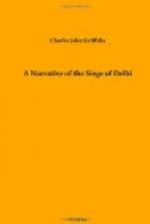The next morning, on the arrival of the insurgent cavalry from Meerut, and the subsequent mutiny of the native infantry regiments and artillery in the cantonments, the massacre of the Europeans in Delhi began.
I forbear entering into all the details of this dreadful butchery; suffice it to say that the chaplain, Mr. Jennings, his wife, Miss C—— d, and nearly all the white people, both in the Palace and the city, were murdered. The editor of the Delhi Gazette and his family were tortured to death by having their throats cut with pieces of broken bottles, but there were conflicting accounts as to how the Jenningses and Miss C—— d met their end. From what I gathered after the siege from some Delhi natives, it was reported that the ladies were stripped naked at the Palace, tied in that condition to the wheels of gun-carriages, dragged up the “Chandni Chauk,” or silver street of Delhi, and there, in the presence of the King’s sons, cut to pieces.
It was not till the following evening, May 12, that C—— d heard of the Mutiny, and, fearing death from the populace of Goorgaon, who had also risen in revolt, he disguised himself as best he could and rode off into the country. After enduring great privations, and the danger of being taken by predatory bands, he at last reached Meerut, and thence accompanied the force to Delhi.
From what he hinted, I feel sure he had it on his mind that his sister, before being murdered, was outraged by the rebels. However this may be, my old school-fellow had become a changed being. All his passions were aroused to their fullest extent, and he thought of nothing but revenge. Armed with sword, revolver, and rifle, he had been present at almost every engagement with the mutineers since leaving Meerut. He was known to most of the regiments in camp, and would attach himself to one or the other on the occasion of a fight, dealing death with his rifle and giving no quarter. Caring nothing for his own life, so long as he succeeded in glutting his vengeance on the murderers of his sister, he exposed himself most recklessly throughout the siege, and never received a wound.
On the day of the final assault I met him in one of the streets after we had gained entrance into the city. He shook my hands, saying that he had put to death all he had come across, not excepting women and children, and from his excited manner and the appearance of his dress—which was covered with blood-stains—I quite believe he told me the truth. One would imagine he must have tired of slaughter during those six days’ fighting in the city, but it was not so. I dined with him at the Palace the night Delhi was taken, when he told me he intended accompanying a small force the next morning to attack a village close by. All my remonstrances at this were of no avail; he vowed to me he would never stay his hand while he had an opportunity of wreaking his vengeance. Poor fellow! that was his last fight; advancing in front of the soldiers, he met his death from a bullet in the heart when assaulting the village.




